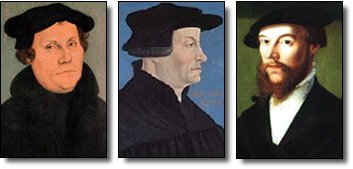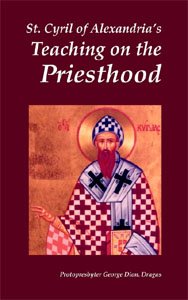LUTHER 1527 Generation


LUTHER 1527
Perhaps they will reproach me, however, for consigning Oecolampadius’ sign-concept so utterly to the devil, and will profess that even if he cannot prove the word “sign of the body” from Scripture, yet there are plenty of Scripture passages which force the conclusion that only bread and wine must be present. Answer: Where then, my fair love? Suppose they say: The Scriptures contradict themselves, and no one can reconcile them unless he believes that mere bread and wine are present in the Supper. Answer: What Scripture? Suppose they say: Oh, where the article of faith is established that Christ ascended to heaven and sits on the right hand of God in his glory. Again, eating flesh is of no avail, John 6[: 63], “The flesh is of no avail.” So, if flesh and blood are in the Supper, Christ could not be sitting at the right hand of God in his glory, and he would be giving us something to eat which is of no use for salvation. Therefore name any Scripture you will, it must make of Christ’s body a “sign of the body,” and this must be the text in the Supper! (Oecolampadius had emphasized the Ascension in Reasonable Answer. St. L. 20, 591, 594; Zwingli had emphasized John 6:63 in his Letter to Alber. C. R. 90, 340 f.; St. L. 17, 1518 f.; and Commentary. LWZ 3, 212 ff. Zwingli put the two arguments together in Clear Instruction. LCC 24, 199 ff.)
Generation
Generation and creation are therefore entirely different ideas. Generation is an immanent, necessary, and perpetual process in the essence of God himself, the Father’s eternal communication of essence or self to the Son; creation, on the contrary, is an outwardly directed, free, single act of the will of God, bringing forth a different and temporal substance out of nothing. The eternal fatherhood and sonship in God is the perfect prototype of all similar relations on earth. But the divine generation differs from all human generation, not only in its absolute spirituality, but also in the fact that it does not produce a new essence of the same kind, but that the begotten is identical in essence with the begetter; for the divine essence is by reason of its simplicity, incapable of division, and by reason of its infinity, incapable of increase. The generation, properly speaking, has no reference at all to the essence, but only to the hypostatical distinction. The Son is begotten not as God, but as Son, not as to his natura, but as to his ...", his peculiar property and his relation to the Father. The divine essence neither begets, nor is begotten. The same is true of the processio of the Holy Ghost, which has reference not to the essence, but only to the person, of the Spirit. In human generation, moreover, the father is older than the son; but in the divine generation, which takes place not in time, but is eternal, there can be no such thing as priority or posteriority of one or the other hypostasis. To the question whether the Son existed before his generation, Cyril of Alexandria answered: “The generation of the Son did not precede his existence, but he existed eternally, and eternally existed by generation.” The Son is as necessary to the being of the Father, as the Father to the being of the Son.
HISTORY OF THE CHRISTIAN CHURCH Schaff Volume 3 NICENE AND POST-NICENE CHRISTIANTY A.D. 311-600
(Pages 658-660)

0 Comments:
Post a Comment
<< Home